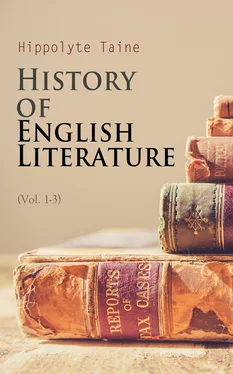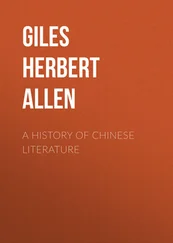His tender eyes upon 'em, he would weep,
As if he meant to make 'em grow again.
Seeing such pretty helpless innocence
Dwell in his face, I asked him all his story.
He told me, that his parents gentle dy'd,
Leaving him to the mercy of the fields,
Which gave him roots; and of the crystal springs,
Which did not stop their courses; and the sun,
Which still, he thank'd him, yielded him his light.
Then he took up his garland, and did shew
What every flower, as country people hold,
Did signify; and how all, order'd thus,
Express'd his grief: And, to my thoughts, did read
The prettiest lecture of his country art
That could be wish'd.... I gladly entertain'd him,
Who was as glad to follow; and have got
The trustiest, loving'st, and the gentlest boy
That ever master kept." [505]
The idyl is self-produced among these human flowers: the dramatic action is stopped before the angelic sweetness of their tenderness and modesty. Sometimes even the idyl is born complete and pure, and the whole theatre is occupied by a sentimental and poetical kind of opera. There are two or three such plays in Shakespeare; in rude Jonson, "The Sad Shepherd"; in Fletcher, "The Faithful Shepherdess." Ridiculous titles nowadays, for they remind us of the interminable platitudes of d'Urfé, or the affected conceits of Florian; charming titles, if we note the sincere and overflowing poetry which they contain. Amoret, the faithful shepherdess, lives in an imaginary country, full of old gods, yet English, like the dewy verdant landscapes in which Rubens sets his nymphs dancing:
"Thro' yon same bending plain
That flings his arms down to the main,
And thro' these thick woods, have I run,
Whose bottom never kiss'd the sun
Since the lusty spring began."...
"For to that holy wood is consecrate
A virtuous well, about whose flow'ry banks
The nimble-footed fairies dance their rounds,
By the pale moon-shine, dipping oftentimes
Their stolen children, so to make them free
From dying flesh, and dull mortality... [506]"See the dew-drops, how they kiss Ev'ry little flower that is; Hanging on their velvet heads, Like a rope of christal beads. See the heavy clouds low falling, And bright Hesperus down calling The dead Night from underground." [507]
These are the plants and the aspects of the ever fresh English country, now enveloped in a pale diaphanous mist, now glistening under the absorbing sun, teeming with grasses so full of sap, so delicate, that in the midst of their most brilliant splendor and their most luxuriant life, we feel that to-morrow will wither them. There, on a summer night, the young men and girls, after their custom, [508]go to gather flowers and plight their troth. Amoret and Perigot are together; Amoret,
"Fairer far
Than the chaste blushing morn, or that fair star
That guides the wand'ring seaman thro' the deep,"
modest like a virgin, and tender as a wife, says to Perigot:
"I do believe thee: 'Tis as hard for me
To think thee false, and harder, than for thee
To hold me foul." [509]
Strongly as she is tried, her heart, once given, never draws back. Perigot, deceived, driven to despair, persuaded that she is unchaste, strikes her with his sword, and casts her bleeding to the ground. The "sullen shepherd" throws her into a well; but the god lets fall "a drop from his watery locks" into the wound; the chaste flesh closes at the touch of the divine water, and the maiden, recovering, goes once more in search of him she loves:
"Speak, if thou be here,
My Perigot! Thy Amoret, thy dear,
Calls on thy loved name.... 'Tis thy friend,
Thy Amoret; come hither, to give end
To these consumings. Look up, gentle boy,
I have forgot those pains and dear annoy
I suffer'd for thy sake, and am content
To be thy love again. Why hast thou rent
Those curled locks, where I have often hung
Ribbons, and damask-roses, and have flung
Waters distill'd to make thee fresh and gay,
Sweeter than nosegays on a bridal day?
Why dost thou cross thine arms, and hang thy face
Down to thy bosom, letting fall apace,
From those two little Heav'ns, upon the ground,
Show'rs of more price, more orient, and more round,
Than those that hang upon the moon's pale brow?
Cease these complainings, shepherd! I am now
The same I ever was, as kind and free,
And can forgive before you ask of me:
Indeed, I can and will." [510]
Who could resist her sweet and sad smile? Still deceived, Perigot wounds her again; she falls, but without anger.
"So this work hath end!
Farewell, and live! be constant to thy friend
That loves thee next." [511]
A nymph cures her, and at last Perigot, disabused, comes and throws himself on his knees before her. She stretches out her arms; in spite of all that he had done, she was not changed:
"I am thy love,
Thy Amoret, for evermore thy love!
Strike once more on my naked breast, I'll prove
As constant still. Oh, could'st thou love me yet,
How soon could I my former griefs forget!" [512]
Such are the touching and poetical figures which these poets introduce in their dramas, or in connection with their dramas, amidst murders, assassinations, the clash of swords, the howl of slaughter, striving against the raging men who adore or torment them, like them carried to excess, transported by their tenderness as the others by their violence; it is a complete exposition, as well as a perfect opposition of the feminine instinct ending in excessive self-abandonment, and of masculine harshness ending in murderous inflexibility. Thus built up and thus provided, the drama of the age was enabled to bring out the inner depths of man, and to set in motion the most powerful human emotions; to bring upon the stage Hamlet and Lear, Ophelia and Cordelia, the death of Desdemona and the butcheries of Macbeth.
[393]"The very age and body of the time, his form and pressure."—Shakespeare.
[394]Ben Jonson, "Every Man in his Humour"; "Cynthia's Revels."
[395]"The Defence of Poesie," ed. 1629, p. 562.
[396]"Winter's Tale, Cymbeline, Julius Cæsar."
[397]Strype, in his "Annals of the Reformation" (1571), says: "Many now were wholly departed from the communion of the church, and came no more to hear divine service in their parish churches, nor received the holy sacrament, according to the laws of the realm." Richard Baxter, in his "Life," published in 1696, says: "We lived in a country that had but little preaching at all.... In the village where I lived the Reader read the Common Prayer briefly; and the rest of the day, even till dark night almost, except Eating time, was spent in Dancing under a Maypole ana a great tree, not far from my father's door, where all the Town did meet together. And though one of my father's own Tenants was the piper, he could not restrain him nor break the sport. So that we could not read the Scripture in our family without the great disturbance of the Taber and Pipe and noise in the street."
Читать дальше












